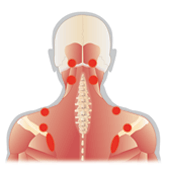Physical Therapy for Neck Pain Relief
The answer is simple: turn to a physical therapist. Whether your neck pain is the result of an unfortunate accident or from sleeping in an awkward position, a physical therapist can help alleviate your pain and reduce the risk of it returning.
See a Physical Therapist First
It can relieve your pain:
- The hands-on treatment of a physical therapist is proven to help treat chronic neck pain.1
It's more effective than other treatment options:
- An active physical therapy program combined with hands-on care is more effective than home exercise or clinical advice for the treatment of chronic neck pain.2
It's reversible:
- Physical therapy doesn't have side effects, so you don't have to worry about permanent damage that could occur from treatment.
It focuses more on your long-term health:
- Physical therapists share a common goal of helping you towards complete recovery. It gets you past the pain.
- Beyond treatment for your existing problem, a physical therapist can help you avoid neck pain in the future. You will receive personalized advice on a therapeutic exercise program, sleeping postures, and ways to set up your desk space that are best for your neck.
Call today: waiting times for appointments are short. Most likely, we'll be able to see you within 48 hours.3

More about Neck Pain
Visit our Medical Library for:
- Causes of neck pain
- Illustrations
- Possible treatments
- Additional web resources links.
Call us today and start feeling better tomorrow!
225-261-7094
Click here to download the physician referral form.
References:
- Gross AR, Hoving JL, Haines TA, et al; Cervical Overview Group. A Cochrane review of manipulation and mobilization for mechanical neck disorders. Spine. 2004;29(14):1541-1548.
- Taimela S., Takala E.P., Askl F.T., Sepp L.K., Parviainen S. Active treatment of chronic neck pain: a prospective randomized intervention. Spine. 2000;25(8):1021-1027.
- CPTA Patient Survey, 2007.
NOTE: Physical therapy may not be for everyone, such as those who have a history of cancer, or severe systemic or neurological conditions; those who have experienced recent/significant unexplained weight loss, have structural deformities, have experienced a recent trauma resulting in fractures, or those who have used steroids.
Disclaimer: The information in this website is intended for informational and educational purposes only and in no way should be taken to be the provision or practice of physical therapy, medical, or professional healthcare advice or services. The information should not be considered complete or exhaustive and should not be used for diagnostic or treatment purposes without first consulting with your physical therapist, occupational therapist, physician or other healthcare provider. The owners of this website accept no responsibility for the misuse of information contained within this website.
